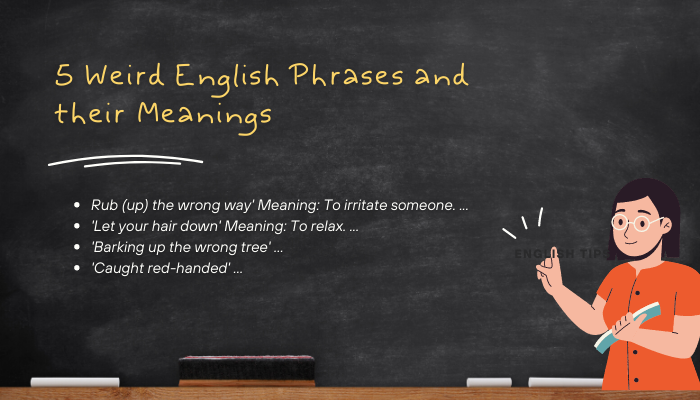Great site to keep my english skills updated for work and travel. I am really enjoying the lessons!
Maria C
 Argentina
Argentina


El inglés es un idioma rico en coloridos dichos, frases y modismos. Desafortunadamente, sin embargo, esto puede hacer que sea bastante difícil de entender. Es por eso que hemos enumerado algunas de las frases en inglés más extrañas para ayudarte a comprender sus expresiones más interesantes.
Modismos extraños en inglés
1. To kick the bucket
Como en muchas culturas, hablar sobre la muerte en inglés puede ser difícil. Por eso tenemos una serie de eufemismos que se refieren a la muerte o al morir. 'To kick the bucket' es una forma informal y, a veces, grosera de decir 'morir'.
Ejemplo: There are loads of things I want to do before I kick the bucket.
2. What’s that got to do with the price of onions?
"What’s that got to do with the price of…?" es una expresión común en inglés que se usa para responder a una declaración que no está en línea con la conversación general. La frase tiene muchas variantes, incluido el "price of fish", el "price of cheese" o el "price of tea in China".
Ejemplos: I’m thinking of taking up ballet dancing.
What’s that got to do with the price of fish?
3. To drop the ball
"Drop the ball" es cometer un error, normalmente haciendo algo estúpido o descuidado.
Ejemplo: I’m really sorry everyone, I really dropped the ball on this one.
4. A different kettle of fish
Decir que algo es una 'different kettle of fish' es decir que algo es muy diferente del tema del que se habla.
Ejemplo: Wanting a car is one thing, paying for it is a whole different kettle of fish.
5. Happy as a pig in muck
Decir que estás “‘as happy as a pig in muck” es decir que estás muy feliz y sereno. La frase también transmite el hecho de que estás en tu lugar favorito o particularmente a gusto.
Ejemplo: When those kids are in the swimming pool they’re happy as a pig in muck.
6. Barking up the wrong tree
'Barking up the wrong tree' es una frase en inglés que se usa para sugerir una conclusión errónea. La frase se relaciona con cuando los perros piensan erróneamente que su presa se ha subido a un árbol cuando en realidad se ha ido volando.
Ejemplo: If you think it was me that ate the last brownie, you’re barking up the wrong tree.
7. A chip on your shoulder
Tener 'a chip on your shoulder' generalmente significa que le guardas rencor a alguien, lo que te hace estar de mal humor. Del mismo modo, la frase también puede significar que alguien tiene derecho o está lleno de sí mismo.
Ejemplo: Pete thinks he’s so clever. He’s got such a chip on his shoulder.
8. Born with a silver spoon in your mouth
En inglés, la palabra "silver spoon" se usa para describir a alguien que nació con dinero. La frase se usa a menudo para decir que la persona no merece su privilegio heredado.
Ejemplo: He’s from such a wealthy family, he was born with a silver spoon in his mouth.
9. Wild goose chase
Decir que algo es una "wild good chase" es una forma de describir una búsqueda desesperada o la búsqueda de algo inalcanzable.
Ejemplo: I’ve been on a wild goose chase this morning trying to find a birthday present for your Father.
10. Let the cat out of the bag
“Let the cat out of the bag” es revelar un secreto, ya sea deliberada o inadvertidamente.
Ejemplo: I accidentally let the cat out of the bag and told Sarah about her surprise birthday party.
11. The greatest thing since sliced bread
'The greatest thing since sliced bread' es una expresión idiomática que significa que algo es un invento particularmente innovador o útil. Aunque el pan rebanado se inventó en 1928, la frase no se utilizó en el lenguaje escrito hasta la década de 1950.
Ejemplo: These new wireless headphones are the best thing since sliced bread.
12. Walking on eggshells
'An eggshell' es la parte exterior frágil de un huevo que se rompe fácilmente. Decir que estás 'walking on eggshells' es decir que estás teniendo mucho cuidado de no ofender a nadie, normalmente por una situación social delicada o sensible.
Ejemplo: My aunt is so sensitive. When she comes to stay, I feel like I’m walking on eggshells.
13. Beat around the bush
Si se está 'beating around the bush', está evitando o retrasando hablar de un tema difícil.
Ejemplo: Just stop beating around the bush and tell me what’s wrong.
14. A piece of cake
Si dices que algo es “piece of cake”, significa que la tarea es realmente fácil, tan fácil como comerse un pedazo de pastel.
Ejemplo: Mental maths is a piece of cake.
15. Once in a blue moon
Hacer algo "once in a blue moon" es hacerlo con muy poca frecuencia. La frase se relaciona con la aparición de una 'blue moon', que es la segunda luna llena dentro de un mes calendario. Esto generalmente solo sucede una vez en alrededor de 32 meses.
Ejemplo: You get up early once in a blue moon!
Verifique su puntaje: pruebe nuestro cuestionario de inglés gratuito + obtenga un bono gratis